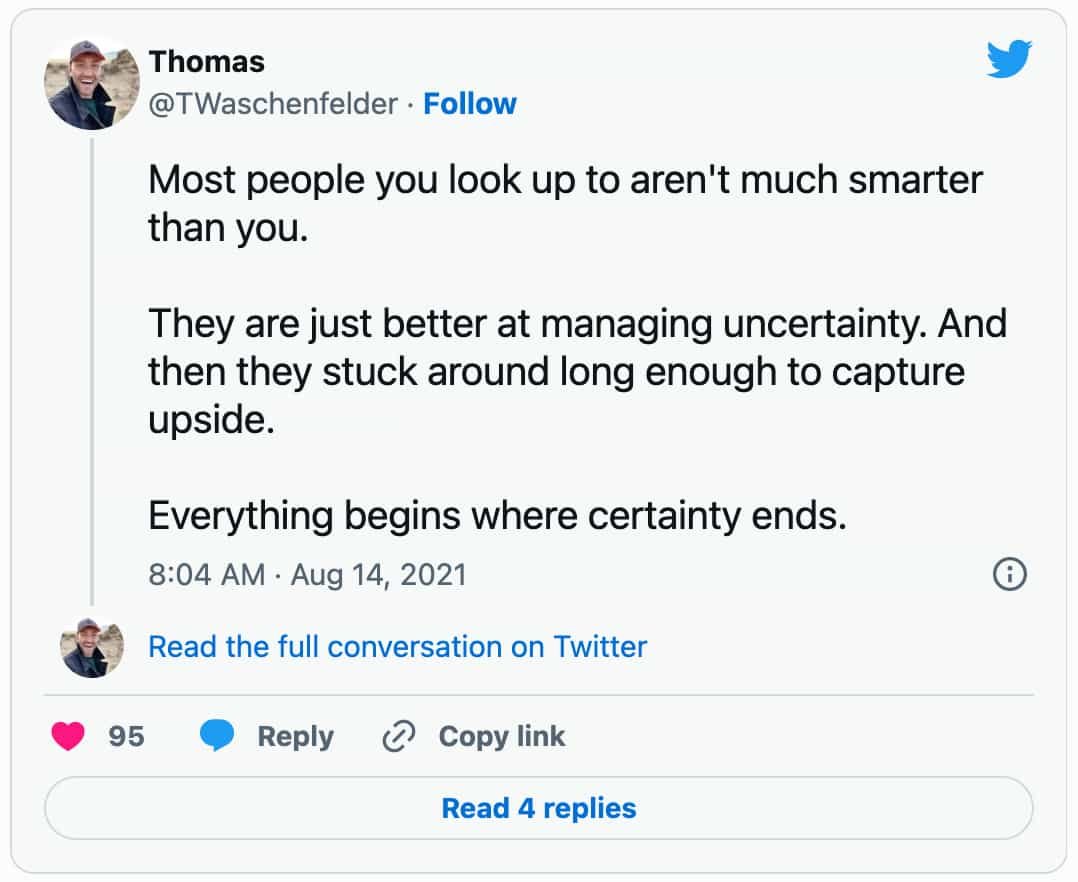Just Because You’re Certain, Doesn’t Make It True
“Certainty is not an indication of truth.”
How many times have you been 100% certain about something, only to find out you were wrong? For me, it’s probably five times a day.
I’m certain about all kinds of things that turn out to be wrong: how a scene should play in my writing… how long something is going to take to get done… what kind of project is certain to sell… whether I started the dishwasher the night before… it goes on.
It wasn’t until I heard Joseph Goldstein articulate this idea in a lecture on the Waking Up app that it struck me how important an insight this is:
“Certainty is not an indication of truth.”
Many of the things you are certain about eventually prove to be wrong. And the faster you can rework your belief system in the face of contradicting evidence, the better off you’ll be.
The Less You Know About Something, The More Certain You Are.
The great irony is that humans are more ‘certain’ about the things they understand the least. Doctors think they can beat the stock market index if they really try. Pro athletes believe they’ll be great venture capitalists. Coca-Cola thought they knew how to make movies.
This is the Dunning-Kruger effect in action - a cognitive bias where people with low ability or knowledge about a field overestimate their own competence. They’re far more certain about subjects they know little about than the people actually working in those fields.
The real experts, meanwhile, tend to underestimate their competence and are less certain about outcomes and their own abilities.
I’m a living example of this. When I quit my job to write full time, I thought my wife and I could write and sell our movie in 3 months. Sure, I had never written any narrative fiction before, wasn’t really in the film industry, and had never tried to write a movie. But how hard hard could it be? Easy peasy lemon squeezy.
Guess what? It was the hardest thing I’ve ever done. And it didn’t take three months… it took two years to get the screenplay to market - about 8x my initial estimate.
It’s funny because in my previous job making car commercials, I knew things always take longer than you expect. I was pretty good at guessing timelines because I would take the “expected” timeline and multiply it by 3-5x to come up with the real one.
For some reason, this wisdom didn’t translate - more proof that the less experience and ability you have in a field, the more certain you are about the outcome. I was certain this thing I had never done before would happen quickly… and I was wrong.
Embrace The Art Of Doubting.
One way to combat a false sense of certainty is to be wary of your own beliefs. Don’t take them at face value. Question, prod, and poke everything you’re “certain” about and see if it holds up under scrutiny. And then update your beliefs as you get new information.
Here are a few ways to embrace the art of doubting:
Question your assumptions. Anything that’s obvious to you should be looked at. The more certain you are, the more you need to scrutinize it.
Look for evidence that affirms or refutes what you’re certain about (giving more weight to the disconfirming evidence to avoid confirmation bias).
Embrace uncertainty. Absolute certainty doesn’t exist, so work fat tail distributions into your models. I like the mantra: Anything can happen at any time.
Be aware of your biases. There are invisible strings pulling on your mind. From incentive-caused bias, to commitment and consistency bias, to reciprocation tendency, to influence by association, the more you understand, the less impacted you’ll be.
Be humble. Quickly and unequivocally admit when you’re wrong. And the more publicly you do it the better. This will force you to learn from your mistake so you don’t repeat it.
When You’re Wrong, Rub Your Face In It.
One way to quickly embrace the art of doubting is to make sure every time you are wrong, you rub your own face in it. That’s why I told you about my mistake with the movie - it ensures I won’t make the same mistake again.
This is what Charlie Munger and Warren Buffett do… Buffett’s letters are full of the mistakes they’ve made, taking full responsibility for every screw-up while articulating exactly what went wrong, and why. That’s what gives them the best chance of avoiding the same mistake in the future.
As Munger says:
“I like people admitting they were complete stupid horses’ asses. I know I’ll perform better if I rub my nose in my mistakes. This is a wonderful trick to learn.”
It’s okay to fuck up - it happens. But it’s not okay to move on without learning the lesson. This is where writing about your mistakes publicly really helps. It forces you to confront them, admit you were wrong, and try to uncover why and how it happened.
Plus, there’s nothing more humbling that writing it down for everyone else to read it. You’ll be far less hasty the next time you’re ‘certain’ about something.
You’re Limited By What You Believe.
If what you’re certain about isn’t true, what does that mean for the things you believe about yourself? About what’s possible for you? About what you’re capable of?
The limits you put on yourself are not only false, but they’re working to keep you from doing what you’re meant to be doing.
Most people don’t even know they’re imposing limits because it’s a limit of ignorance.
Before I was introduced to the minds and ideas of Buffett and Munger and Naval Ravikant and Nassim Taleb, I was ignorant of what was possible in my life. I could only see one path: the corporate battle ground… the slow grind upwards towards… what exactly?
These great thinkers made me ask the hard questions about my life - about what I wanted it to look like. About what it could look like.
The only limit to what you’re capable of is your belief about what you’re capable of. So question everything. Just because you’re certain, doesn’t make it true.
Start now.




